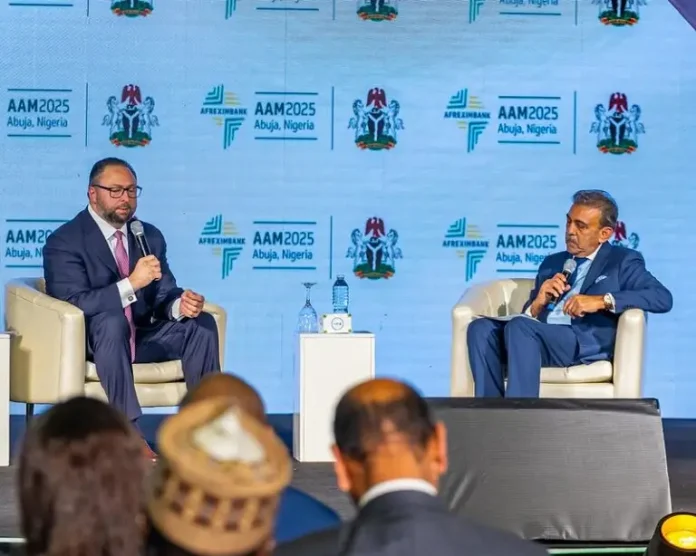News Investigators/ Africa is poised to become an economic superpower but its full potential hinges on making strategic choices about its trade partners and internal reforms, Jason Miller, former Senior Advisor to President Donald Trump says.
Mr Miller, a Communication Strategist, spoke during a conversation with Viswanathan Shankar, CEO of Gateway Partners, at the 32nd Afreximbank Annual Meetings (AMM2025) on Thursday in Abuja.
The AAM2025, with the theme, “Building The Future On Decades Of Resilience”, is from June 25 to June 28.
Speaking to an audience of policymakers and financiers, Mr Miller broke down U.S. evolving trade posture and its implications for the continent.
He painted an “optimistic vision” for U.S.-Africa trade relations, contrasting America’s approach with what he termed “debt diplomacy” from other global players.
He said Africa’s rise is inevitable but cautioned that realising its potential hinged on strategic choices..
“This is Africa’s century,” Mr Miller said, projecting that by 2050, Africa would surpass Europe as the world’s third-largest economic bloc, with Nigeria among the top 10 global economies.
By 2100, he added, sub-Saharan Africa would host four of the world’s most populous nations, positioning the continent as an economic superpower.
He, however, cautioned that “If these opportunities aren’t seized strategically, Africa risks being taken advantage of again.”
Mr Miller frowned at the decades of exploitative practices by outsiders who “took, took, took, leaving broken promises.”
According to him, U.S.’s engagement is built on strategic partnerships anchored in private capital, not debt traps, military occupations, or hollow rhetoric.
He outlined key demands for nations seeking U.S. partnership:
Firstly, Africa “must demand tangible value over empty deals, avoiding unsustainable debt disguised as aid.”
“Partnerships should prioritise foreign direct investment in future-proof infrastructure like roads, ports, data centers, and clean energy.’’
Mr Miller highlighted Africa’s critical minerals and youthful workforce as crucial for dominating the Artificial Intelligence supply chain, a shift he likened to the Industrial Revolution.
Secondly, accelerating business climate reforms is essential.
“Enforcing contracts, stabilising currencies, and rooting out corruption are not just suggestions but the price of admission for attracting U.S. pension funds and private capital.”
While commending Nigeria’s “gutsy” currency reforms, he urged faster, broader action across the continent.
Thirdly, Africa must “choose allies wisely.”
Mr Miller drew sharp contrasts between China’s record of “unregulated fishing, environmental disasters, and crippling debt” and U.S. contributions such as PEPFAR’s HIV/AIDS support and security cooperation.
He said: “True friendship respects sovereignty and borders without exploitation.”
On U.S. policy, Mr Miller discussed the African Growth and Opportunity Act (AGOA), set to expire in September, suggesting an uncertain future.
“Why renew one-way preferences, If African nations impose tariffs on U.S. goods or favour Chinese partners?”
He advocated for proactive renegotiation focused on reciprocity.
Mr Miller defended Trump’s tariffs as multipurpose tools, protecting strategic industries and forcing fairer trade terms.
He said the U.S. Development Finance Corporation (DFC) was a key catalyst for Africa, deploying profit-driven investments.
“This is revenue-generating capital, not debt,” he emphasised, urging reforms to attract major institutional investors.
Offering candid advice for African leaders, Miller stressed the importance of preparation.
He advised following Trump on Truth Social to understand his priorities and urged leaders to engage with “specific asks and solutions, no photo-ops.”
He also encouraged them to persuade chief executive officers and investors, not just bureaucrats, to amplify Africa’s economic narrative globally.
Mr Miller called for Africa’s potential to translate into “provable partnerships.”
He also advocated for renegotiating AGOA, fast-tracking business reforms, demanding infrastructure-for-minerals deals, and proactively engaging the DFC. “Above all, champion stability, the bedrock of investment.”
Mr Miller urged African leaders not to settle for lip service.
“Don’t settle for lip service. Demand partnerships. That’s how Africa becomes powerful, wealthy, and great – on its own terms.”
Viswanathan Shankar, CEO of Gateway Partners, revealed Miller’s appointment as Senior Advisor to Gateway Partners, a role Miller pledged to use to “bring American capital to Africa’s future industries.”
NAN


